
A young girl holds a sign at a rally in Butler County.
Susan Phillips / StateImpactPA


A young girl holds a sign at a rally in Butler County.
Susan Phillips / StateImpactPA

Susan Phillips / StateImpactPA
A young girl holds a sign at a rally in Butler County.
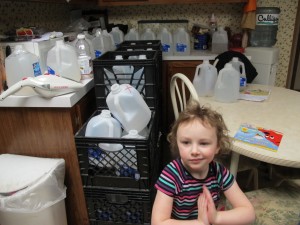
Susan Phillips / StateImpact PA
Skylar Sowatsky sits at the kitchen table, surrounded by water jugs. Sowatsky’s mother Kim McEvoy says once gas drilling began, her water turned gray and cloudy. Now, her well is running dry.
Gas drilling has turned some quiet rural areas of Pennsylvania into growing industrial zones. Residents complain of increased truck traffic, bad air, and contaminated well water. Some of those residents have turned to activism. Others have filed lawsuits. But a growing number of Pennsylvania residents living near Marcellus Shale sites are also packing up their bags and moving.
Boxes full of books are piling up in Kim McEvoy’s dining room in the house where she lives with her three-year-old daughter Skylar and her fiance, Peter Sowatsky. It’s a small one-story, three-bedroom house at the end of a dirt road in Butler County. Along with a swing-set, a collection of toys, and a dog-house, a for-sale sign sits in her front yard. A large black dog is tied up near a tree, a smaller dog chases a bunny around the living room. Skylar Sowatsky is eager to show a visitor around the house.
“This is my new toy, and I got this toy train in the toy aisle,” says Skylar. “I’m three old.”
Along with the boxes, water jugs are also plentiful, and dominate the kitchen. Skylar explains the water jugs and the moving boxes this way:
“Because we have black water.”
About a year ago, Kim McEvoy’s water began to look gray. Then it turned black. She called a company that drills water wells in the area. A man told her to call the gas company that was drilling nearby. Before that phone call, McEvoy didn’t really know much about the gas drilling happening in her rural community. She doesn’t own a big piece of land, so the gas companies never asked to lease her mineral rights. But, she was hopeful they would help with her water.
“The gas company did come out and test in April,” said McEvoy. “And I thought great I’m gonna find out why my water is this grayish color.”
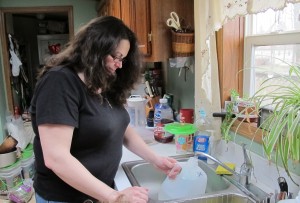
Susan Phillips/ StateImpact Pennsylvania
Kim McEvoy says after gas drilling began in her township, her water has never been the same.
But the company didn’t send her the test results until July. And even then, a list of chemicals didn’t really explain much. In the meantime, the company, Rex Energy did provide her with clean water that she could use to shower and clean. That ended in January, after the Department of Environmental Protection concluded that Rex Energy’s drilling did not contaminate, or alter, McEvoy’s water supply, nor the well water of other families who live in an area of Connoquenessing Township called the Woodlands. A DEP spokesman says the gas wells are separated from the water wells by several thousand feet, too far, he says, to have had an impact.
And yet, to make matters worse, McEvoy’s well is now running dry. And so is her patience.
When she talks about water, McEvoy sounds like a woman who might live in Haiti, or sub-saharan Africa, not Butler County, Pennsylvania.
“It’s terrible,” says McEvoy. “It is what you focus on every day. When you wake up in the morning, where am I getting a shower. Oh I have to do laundry. Where we’re getting the water, how much water do you need. And that’s it. That’s all you worry about all the time — water, water, water. There’s no opening your tap, and you got water, to brush your teeth. That does not exist here.”
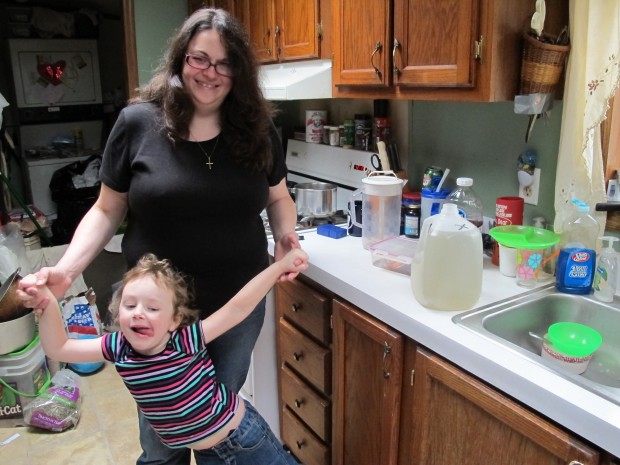
Susan Phillips / StateImpactPA
A jug of brown water, with a black ‘X’ sits on Kim McEvoy’s counter. McEvoy says she needs to move to a town that provides treated water.
To brush her teeth, McEvoy pours bottled tap water that her fiance brings home from work. She collects rainwater in a barrel set up in her backyard. All the water jugs are coded.
“The ones with the red X’s are the ones that we fill up outside with the outside barrel, those are just toilet only,” explains McEvoy. “But the black ones, or the blue ones, those you can use to wash your hands, because they’re public water.”
Three-year-old Skylar chimes in. “Yeah, And clean teethes, too.”
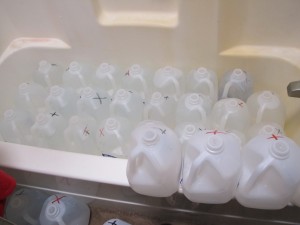
Susan Phillips / StateImpact PA
McEvoy’s well is running dry, and she can’t use her water to bathe and shower. So her bathtub becomes a convenient storage tank for water jugs used to flush the toilet.
McEvoy now has to take her clothes to a Laundromat. Her bathtub is full of water jugs. To shower, and bathe her 3-year-old daughter, McEvoy walks half a mile to a friend’s hunting cabin, pulling Skylar along in a wagon.
“So yeah, I have to leave because, it gets old really fast, hauling water,” says McEvoy.
She lets her tap run to show what her water looks like – as it fills a jug it turns brown. The DEP told Kim that nothing is wrong with her water, and that the issues are “aesthetic.”
“I don’t really know,” said McEvoy. “I just know that something happened. Something happened here when they came in, the drills got put in the ground, now I have this funny water.”
A DEP spokesman confirmed that their investigation of McEvoy’s water found no link to nearby gas drilling in Connequennessing Township.
Now, McEvoy is looking to sell her one-story, three-bedroom house, but it’s listed for less than what she owes on it.
McEvoy’s realtor Steve Warrene doesn’t have much hope.
“If it had public water today, I could probably sell it for $120,000,” said Warrene. “Right now with no water, we got it listed at $87,900. It’s not gonna sell because other houses in the area without water are selling for between $15,000 and $30,000.”
But Warrene says houses with public water are rising in value, because residents want a secure water source.
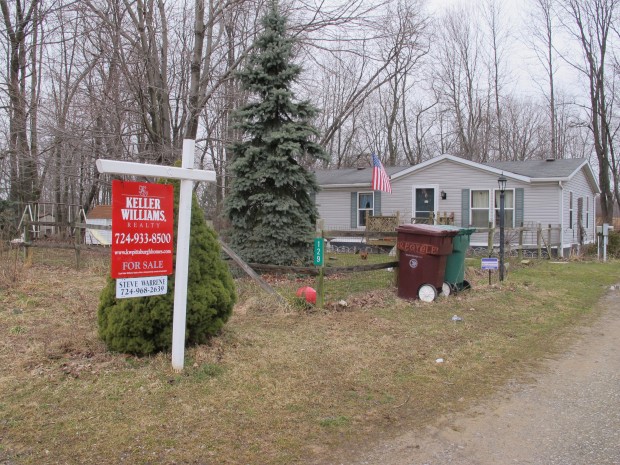
Susan Phillips / StateImpact PA
A for sale sign sits outside of Kim McEvoy’s house in Butler County. Her realtor says without water, the house has little chance of selling.
He says McEvoy could put in a $15,000 dollar cistern, and pay up to $400 dollars a month to fill it. But McEvoy says she can’t afford that.
“That’s a lot of money, this isn’t a mansion I live in here.”
McEvoy’s muddy water has left her underwater, financially. So if she moves, and stops paying her mortgage, she could be facing foreclosure.
“I would rather have bad credit than be dying because my water is so bad. It’s crazy you have to choose credit or water. I’m choosing water.”
McEvoy never thought she would ever leave her home. She wanted to send her daughter to a Christian school down the road. But now, she’s looking to find a home in the suburbs.
“Oh, I’m going to cry, I already know it,” says McEvoy. “I cry already just thinking about it. But it has to be done for safety reasons.”
McEvoy is not alone with her water troubles. Rex Energy stopped water deliveries to ten families in March. She’s never before been politically active, but on the day I visit, McEvoy and her new friend Janet McIntyre are preparing to speak at a rally. Both are nervous.
Janet and Kim met after learning they both had water issues. But Janet McIntyre says she can’t move.
“I really can’t do anything else, I’m stuck,” says McIntyre. “That’s how I really feel, I’m stuck.”
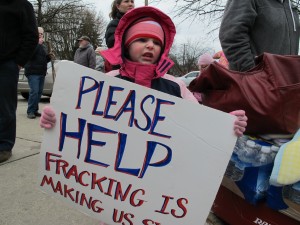
Susan Phillips / StateImpact PA
Skylar Sowatsky at a rally in Butler County aimed at supporting and collecting water for residents of Connequenessing Township.
At a rally in nearby Butler City, about 75 people gathered to donate water to families like the McEvoys and the McIntyres. It’s McEvoy’s first time speaking to such a crowd. She thanks them for the water and pleads for help from the local township politicians.
‘Because this is America, it’s about the people, it’s we the people not we the corporations, not we the industry.”
As they rely on water donated by nearby churches, McIntyre and McEvoy are trying to convince the local township to pipe in treated water. But the cost could run in the millions of dollars.
StateImpact Pennsylvania is a collaboration among WITF, WHYY, and the Allegheny Front. Reporters Reid Frazier, Rachel McDevitt and Susan Phillips cover the commonwealth’s energy economy. Read their reports on this site, and hear them on public radio stations across Pennsylvania.
(listed by story count)
StateImpact Pennsylvania is a collaboration among WITF, WHYY, and the Allegheny Front. Reporters Reid Frazier, Rachel McDevitt and Susan Phillips cover the commonwealth’s energy economy. Read their reports on this site, and hear them on public radio stations across Pennsylvania.
Climate Solutions, a collaboration of news organizations, educational institutions and a theater company, uses engagement, education and storytelling to help central Pennsylvanians toward climate change literacy, resilience and adaptation. Our work will amplify how people are finding solutions to the challenges presented by a warming world.